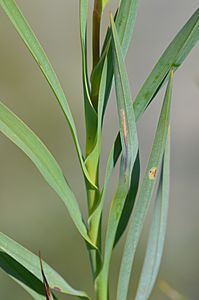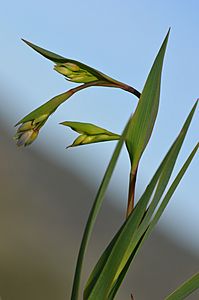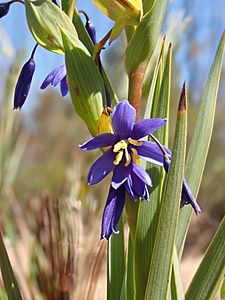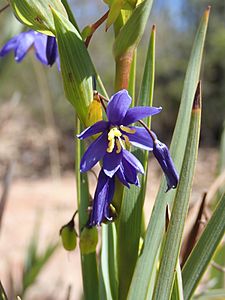Nodding blue lily facts for kids
Quick facts for kids Nodding blue lily |
|
|---|---|
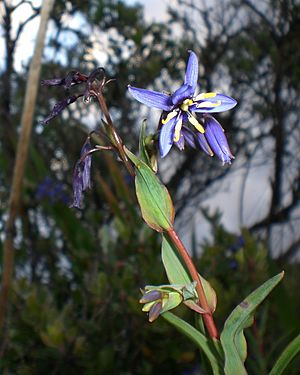 |
|
| Scientific classification | |
| Genus: |
Stypandra
|
| Species: |
glauca
|
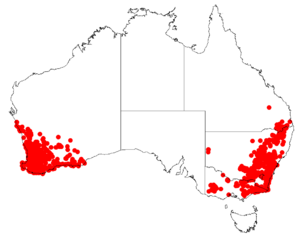 |
|
| Occurrence data from AVH | |
| Synonyms | |
|
Stypandra imbricata R.Br. |
|
The Stypandra glauca is a beautiful plant often called the nodding blue lily or blind grass. It's a type of perennial plant, which means it lives for more than two years. This plant grows from a special underground stem called a rhizome. You can find it all over southern Australia.
Contents
What the Nodding Blue Lily Looks Like
This plant has pretty, lily-like flowers. They are usually a lovely blue color. In the middle of the flowers, you'll see bright yellow parts called stamens. These flowers bloom during the cooler months, from winter into spring.
The leaves of the Stypandra glauca are also special. They have a bluish tint, which is why the plant's scientific name includes glauca. This word comes from Greek and means "bluish-green" or "silvery-blue." The leaves wrap around the stem and grow up to 200 millimeters long. They are arranged in an alternating pattern along the stem.
Where the Nodding Blue Lily Grows
The nodding blue lily is very common in its home country, Australia. It grows naturally in many southern parts of the continent. Because it's so pretty, people also like to grow it in their gardens. You might spot it in parks or even along roadsides if you visit Australia.
How This Plant Was Discovered
The Stypandra glauca was first officially described in 1810. A famous botanist named Robert Brown gave it its scientific name. He wrote about it in his important book, Prodromus Florae Novae Hollandiae. This book described many new plants from Australia.
Important Safety Note
It's important to know that while the nodding blue lily is beautiful, it can be harmful to some animals. If animals, especially goats, eat the flowering parts of this plant, it can make them very sick. In some cases, it can even affect their eyesight and cause them to become blind. So, it's best for animals to avoid eating this plant.
Gallery
See also
 In Spanish: Stypandra glauca para niños
In Spanish: Stypandra glauca para niños


